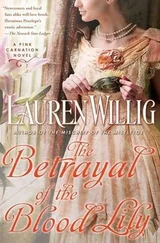Lily nodded. “It’s the best one,” she said in a flat voice.
She glanced at Mabel, who looked very calm next to the canvas. “But,” she said, “it’s a little scary, too, because,” she stammered, “it’s so personal.” Lily wiped sweat from her upper lip. Her stomach gurgled. Maybe I’m coming down with something, she thought. Looking from Ed to Mabel, she sensed that between them they had made something she couldn’t touch. Not the painting. The painting had come out of it, but that wasn’t what she meant. Lily stepped away from the canvas and turned to Mabel.
“There are lots of things I don’t know about,” she said. “Like painting, but I can tell that Ed painted you as you really are, and I know that takes a lot of talent. You must have told him all about yourself for it to work.” She paused and lowered her voice. “Maybe you even told him things you never told anybody before.” She looked at Ed. “But I wonder if he told you about him. I mean the stuff that really matters.” Lily took a deep breath. “All day long you sit here and listen to people telling you their most private thoughts — Tex and Dolores and Stanley and now Mabel. They’re telling you about their parents and their sweethearts, and even about their secret fantasies, and you take it all in like a big sponge — in the name of art.” Lily heard her voice go shrill on the last word. She tried to calm herself. “You’ve told me about yourself, but it’s nothing compared to what these people have been telling you. I don’t even know who your mother was.” Lily pointed toward the open door. “Right through there, I saw you giving Dolores money like she’s your oldest friend in the world, but you don’t tell me beans about it. And everybody in town’s jabbering about all the girls you’ve had, a goddamned assembly line of tits and ass, and from you, nothing.” Lily’s jaw shook. She hadn’t known she was this upset. Her own words were egging her on. “And then I hear you were over at Swensen’s digging up corpses to draw. Did you mention that to me? No sirree! And”—she stopped and looked at them—“just for the record, I’d like to know where the hell I fit in? The two of you are so tight these days, there’s no goddamned room for anybody else!” Lily looked at the two surprised faces. She waited, but neither one of them said anything.
Lily nodded at Ed. Mabel looked white.
After several seconds, Ed started talking. His voice didn’t sound agitated, but his forehead wrinkled, and Lily was glad to see some sign of distress in his face. “I know that I’m stubborn about my work,” he said, “and I know that while I’m doing it, it’s sometimes hard for me to think about anything else. I feel responsible for the people I paint, because the portraits are not just about borrowing somebody’s body for a while. That’s why I gave Dolores money. I’m not done with her, just because I’m finished painting her. Do you understand?”
Lily saw that Ed was looking for words.
“And I don’t pry,” he said. “Whatever people tell me, they tell me freely. I’m not picking at people’s souls for ugly secrets…” He sighed and rubbed his face. “And as for this red-hot lover business, I honestly don’t know what it’s all about. It’s been overblown to such a degree that I don’t even recognize myself.” He paused and examined Lily as if he were trying to remember something. He smiled. “I guess I was stupid to think that I could slide in and out of the funeral home without causing a stir. For years, I’ve been thinking of doing a series of paintings called ‘The Dead.’ I’ve always had something very quiet in mind, not sensational or ghoulish — no murder victims or anything like that.” He took a breath. “As for Mr. Hansen, the funeral’s tomorrow, and I missed my chance. I did a sketch from memory, but it’s not enough. It’s too bad because I liked his face.”
Mabel was watching Ed very closely, and Lily could see signs of strain around her mouth.
Ed continued to look at Lily. “As for you, I can’t see that my painting interferes in any way with my feelings for you.” He looked down at his hands, turned them over and flexed his fingers. “Being with you has made me very happy.”
Lily knew Ed wasn’t lying, knew that he believed everything he had said, and yet she felt cheated by his answers. It all made sense, and yet there was something wrong with it. She didn’t know why his painting of Mabel changed what was between him and her, but it did. She just couldn’t explain it. She didn’t know whether Ed’s logic was false or whether logic didn’t work in trying to answer what she had said. It was like pointing at a squashed gopher on the road and having it explained to her with an algebraic formula.
After that, the three of them hardly talked for about an hour. Mabel sat in her chair, and Lily found a place on the floor. Ed went back to the portrait, and Lily watched him. Sometimes he closed his eyes as though he were looking at a picture of Mabel inside himself. He paced, and Lily listened to his steps, back and forth, back and forth. Mabel watched Ed intently, and Lily felt sorry for her. She’s so happy to be near him, Lily thought. He painted her happiness, but he doesn’t see it. With the real person, he’s blind.
When Ed asked Mabel to talk to him again, he didn’t ask Lily to leave, and neither did Mabel. Their conspicuous inclusion of her didn’t comfort her much, however. She might be allowed to overhear Mabel’s monologue, but her speech was meant for Ed and nobody else.
“I met Evan only days after my twenty-sixth birthday in a bookstore. I loved him right away. After three days we were married, and we stayed together until he died — fifteen years. And that was short. We had no children. The doctors couldn’t find anything wrong with me. Of course that was a long time ago. It might have been Evan. We never knew.” Mabel paused. “But it’s funny what you think about later, what you remember…” Mabel wasn’t looking at Ed or at Lily, but out into the room. “I remember how he changed with the seasons, his body, I mean, how he looked in different lights — summer and winter. You know, there’s a time when you feel the seasons moving — when fall becomes winter or winter becomes spring — that ambiguous threshold. He was lit differently, and he smelled different, and I”—Mabel rubbed her hands and looked at the ceiling—“I loved that change, but I also loved remembering that he had been like that before — last winter or last spring.… I’ve often thought about my marriage in terms of seasonal light.” Mabel cocked her head near her shoulder and smiled shyly. Like a girl, Lily thought.
After a silence, Mabel said, “The grief was terrible, but it was ordinary, if I can use that word. It wasn’t anybody’s fault that Evan died. People die. They die suddenly like Evan or slowly like my father, and I wasn’t so stupid as to ask, ‘Why Evan? Why the person I loved most in the world?’ Why not, after all? It’s when you’ve made your own grief, when you’re guilty, that it can’t be borne.”
Lily stared at Mabel’s rigid posture. What Mabel had said about guilt aggravated Lily’s own dread, not of Martin, she realized, but of herself. She heard Ed speak and Mabel answer him, but she didn’t listen to the content of their conversation. Ed moved toward the canvas. He looked at it, his eyes half closed, and spoke to Mabel. “It’s yours as much as mine. In about a week, I’ll want to know what the story is.”
Mabel nodded. Her head seemed very small and her lips pale.
The rest of the afternoon passed slowly. Lily lay on the floor with a pillow while Ed painted, and Mabel sat quietly in her chair. Lily took out a copy of the Star that was in her bag and began to leaf through it. She had bought it because it had a picture of Marilyn on the cover. But when she turned to the article inside, she saw it wasn’t about Marilyn at all, but a housewife in Normal, Illinois, who was gradually turning into Marilyn Monroe. Although it was written in the third person, the article was called “The Spirit of Marilyn Monroe Is Taking Over My Body.” A series of six photographs accompanied the article, showing the slow transformation of Angela Hokenburg, a brown-haired, long-nosed person, into the radiant, platinum Marilyn. Lily studied the pictures. The story was trash, but it made Lily think of the photos she had seen of Norma Jean on a beach somewhere with her brown hair and unplucked eyebrows. They turned her into Marilyn Monroe, too, Lily thought.
Читать дальше












